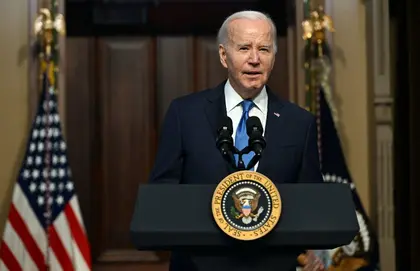The US has announced its intention to impose sanctions on foreign banks that support Russia’s war in Ukraine. This decision, made under an executive order signed by President Joe Biden, is aimed at exerting economic pressure on Moscow and sending a clear message to financial institutions that they face a “very stark choice.” It will be authorized to issue so-called secondary sanctions against financial officials, potentially blocking their access to correspondent banks in the United States.
The move comes as Russia seeks to reduce its reliance on traditional Western currencies and diversify its economic partnerships, particularly with China. Biden also plans to ban products originating from Russia, including diamonds processed elsewhere. This action is part of a broader effort to dissuade support for the Russian military and bolster Ukraine, which has received significant military assistance from them since the 2022 invasion. Biden’s decision reflects ongoing geopolitical tensions and the use of economic measures to influence international conflicts.
Targeting Financial Officials and Diversification Efforts by Russia
Under the proposed measures, it will have the authority to issue secondary sanctions against financial officials, potentially restricting their access to correspondent banks within the United States. This move comes at a critical juncture as Russia endeavors to decrease its dependence on traditional Western currencies and explores avenues to diversify its economic partnerships, notably with China.
The administration’s decision reflects a concerted effort to dissuade support for the Russian military and fortify Ukraine, a country that has been the recipient of substantial military assistance from the United States since the invasion in 2022. By targeting foreign banks aiding Russia, it aims to choke off crucial financial support that fuels Moscow’s military activities in Ukraine.
It’s decision to target banks supporting Russia’s war in Ukraine represents a significant escalation in its efforts to exert pressure on Moscow. By imposing sanctions on foreign banks that facilitate significant transactions for Russia, it aims to disrupt the country’s military-industrial base and dissuade international support for its actions in Ukraine. This move is part of a broader strategy to counter Russian aggression and support Ukraine, which has been a key recipient of United States’s military assistance since the 2022 invasion.
Reason behind the decision of US
The decision also reflects the evolving dynamics of global economic relations, particularly as Russia seeks to reduce its reliance on traditional Western currencies and strengthen its economic ties with China. The ban on Russian-origin products, such as diamonds processed elsewhere, further underscores the determination to isolate Russia economically and limit its access to international markets. This development is likely to have significant implications for the geopolitical landscape and the ongoing conflict in Eastern Europe.
The imposition of secondary sanctions on financial officials is a strategic maneuver, intending to isolate individuals responsible for facilitating Russia’s war efforts. Blocking their access to correspondent banks in the United States not only hampers their financial dealings but also serves as a deterrent for others contemplating similar actions.
Simultaneously, Russia’s efforts to reduce reliance on Western currencies and foster economic ties with China have prompted them to adopt a proactive stance. The geopolitical landscape is witnessing a shift as Moscow seeks to forge stronger economic partnerships beyond its traditional Western allies. The response reflects an acknowledgment of these changes and an attempt to counterbalance Russia’s maneuvering by wielding economic leverage.
Ban on Russian Products

In addition to financial sanctions, it is planning to implement a ban on products originating from Russia, including diamonds processed elsewhere. This broader embargo underscores the multifaceted approach is adopting to exert maximum pressure on Moscow. By targeting not only the financial sector but also key export products, it aims to create a comprehensive and impactful response to Russia’s actions.
This series of measures is in line with the broader strategy of employing economic instruments to influence international conflicts. The use of sanctions as a tool of statecraft has become increasingly prevalent in recent years, with nations recognizing the potency of economic pressure in shaping geopolitical outcomes. The decision to implement such sweeping sanctions signifies a commitment to employing all available means to deter Russian aggression in Ukraine.
The geopolitical tensions underlying this move are palpable, with positioning itself as a force against expansionist actions by Russia. The announcement comes amidst ongoing negotiations and diplomatic efforts to resolve the conflict, signaling the complexity and gravity of the situation. The States is not only sending a clear message to Russia but is also rallying international support for its stance, seeking a united front against actions that threaten global stability.
The decision to target banks supporting Russia’s war in Ukraine has drawn attention to the use of economic measures in international conflicts. By imposing sanctions on foreign banks that facilitate significant transactions for Russia, it aims to disrupt the country’s military-industrial base and dissuade international support for its actions in Ukraine.
This move is part of a broader strategy to counter Russian aggression and support Ukraine, which has been a key recipient of military assistance since the 2022 invasion. The decision also reflects the evolving dynamics of global economic relations, particularly as Russia seeks to reduce its reliance on traditional Western currencies and strengthen its economic ties with China. The ban on Russian-origin products, such as diamonds processed elsewhere, further underscores the determination to isolate Russia economically and limit its access to international markets. This development is likely to have significant implications for the geopolitical landscape and the ongoing conflict in Eastern Europe.
Economics*Geopolitics= Epic Saga
As they unveils these comprehensive sanctions, the world watches closely, recognizing the pivotal role economic measures play in contemporary geopolitics. The success of such sanctions, however, hinges not only on their implementation but on the broader international response and the ability to navigate the complex web of global alliances. The unfolding developments will undoubtedly shape the trajectory of the conflict in Ukraine and the geopolitical landscape at large.
Read also: Biden Orders Intense Probe as Japan’s Steel Deal Raises Concerns













